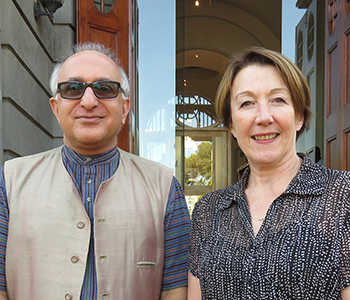Latest News Archive
Please select Category, Year, and then Month to display items
12 October 2020
|
Story Arina Engelbrecht
|
Photo Supplied
 Arina Engelbrecht from Organisational Development and Employee Well-being believes physical activity has a number of benefits for one’s health, including stress relief.
Arina Engelbrecht from Organisational Development and Employee Well-being believes physical activity has a number of benefits for one’s health, including stress relief.
Being physically active plays a big role in preventing the development of mental-health problems and in improving the quality of life of people experiencing mental-health problems.
Treatment for depression
Physical activity can be an alternative treatment for depression. It can be used as a stand-alone treatment or in combination with medication and/or psychological therapy. It promotes all kinds of changes in the brain, including neural growth, reduced inflammation, and new activity patterns are formed that promote feelings of calm and well-being. It releases endorphins – powerful chemicals in the brain that energise your spirit and make you feel good.
Physical activity can be very effective in relieving stress. Research in adults has found that physically active individuals tend to have lower stress levels compared to individuals who are less active. It also leads to improved sleep. When a person sleeps better and feels more rested, overall quality of life improves. They cope better with daily life stressors.
Reduce Alzheimer's risk
Regular physical activity can reduce your risk of developing Alzheimer's disease by up to 50%. It can also slow down further deterioration in those who have already started to develop cognitive problems. It stimulates the brain’s ability to maintain old connections as well as to make new ones.
A study asked people to rate their mood immediately after periods of physical activity (e.g. going for a walk/run, cycling, doing housework) and periods of inactivity (e.g. reading a book or watching television). Researchers found that participants felt more content, more awake, and calmer after being physically active compared to after periods of inactivity.
In conclusion, people who are physically active feel a sense of well-being, feel more energetic throughout the day, sleep better at night, have sharper memories, and feel more relaxed and positive about themselves and their lives.
“Being physically active not only changes your body, it changes your mind,
attitude, and your mood.” – Arina Engelbrecht
Andrew Mellon Foundation renews ongoing support for UFS projects
2017-04-10
 Dr Saleem Badat and Annemia van der Heever.
Dr Saleem Badat and Annemia van der Heever.The University of the Free State (UFS) was first awarded a grant by the Andrew W Mellon Foundation (AWMF) in 2015 to fund several projects between 2015 and 2016 under the International Higher Education Strategic projects fund. The programme’s director, Dr Saleem Badat, visited the UFS on 23 March 2017 as part of his annual first-quarter feedback sessions, with not only the UFS but other universities around the country that benefited from the programme. Top of the agenda was a meeting with principal investigators of projects funded by the foundation, to discuss the UFS’s institutional priorities for funding, alongside the university’s management, to discuss possible intra-institutional projects to be undertaken with other universities.
During his visit, Dr Badat met with Prof Nicky Morgan, UFS Acting Vice-Chancellor and Rector, as well as the AWMF representative, Annamia van der Heever, Director: Institutional Advancement. He discussed future plans with managers of the Programme for Innovation in the Artform Development, #Movements project, Inclusive Professoriate Grant and the Curriculum reform programme which involved seven other universities.
The AWMF, through its projects, is instrumental in developing and maintaining strong higher education institutions that produce knowledge and high-quality graduates, and advances social justice. The projects further aim to deepen and broaden public understanding and support for the arts and humanities, diversity and inclusion. “The Foundation each year presents universities with wonderful opportunities to improve teaching, learning and research in the humanities. We are working hard with the Faculty of Humanities on possible submissions for 2017,” said Van der Heever.
During 2017 between $10.8 million and $12 million will be available for grants by the Foundation’s International Higher Education and Strategic Projects programme. The Vice-Chancellor’s Office will continue to serve as a contact point and administrative support for UFS projects currently funded by AWMF. Institutional Advancement will assist project leaders to draft submissions to the Foundation this year and in the future. In 2018 AWMF will celebrate 30 years of involvement in supporting higher education in South Africa.